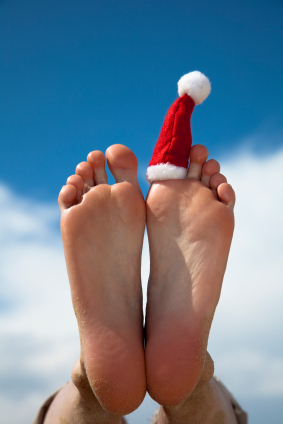
With
the holidays fast approaching, many individuals may feel the mounting
pressure of finding the perfect gift by spending hours at the mall.
The pressure placed on feet dashing from store to store can add up,
and in individuals with diabetes can become dangerous.
Even though the holiday of St. Nicholas passed this past week, in
which children leave their shoes out to be filled with treats,
individuals with diabetes may still want to leave their old shoes out
for good and opt for a better, pressure relieving pair.
High
pressure in a healthy foot signals pain, and subsequent alleviation
of the inciting pressure by the person moving their foot or changing
their shoe to stop the pain from occurring. In diabetic
individuals with peripheral neuropathy, pain and areas of high
pressure cannot be felt due to loss of sensation. This loss of
sensation causes of loss of protection to the foot and wounds may
develop in areas of abnormally high pressure. Any deformity
that predisposes the foot to rub in a shoe creates an area that is
more likely to ulcerate. Surgery to remove deformities
including bunions, hammer toes and bony bumps in
the ball of the foot are one of the ways that your podiatrist
may remove an area of increased pressure that is likely to develop or
has previously developed an ulcer. Surgery to lengthen the
tendon that attaches the calf muscles to the heel bone is also used
to lessen pressure on the ball of the foot. When this tendon is
too tight, the heel is lifted and the front of the foot is levered
down towards the ground, creating an area of high pressure.
Along
with surgery, regular callus and corn removal by your
podiatrist is also very helpful in removing pressure. Shoes,
casting and custom orthotics are all used to better disperse pressure
on the foot. These treatment means are also useful to prevent
ulcers from developing or recurring. By custom molding
shoes to the foot, deformities are accommodated for and areas of
high pressure are relieved. Custom orthotics for diabetic
patients with neuropathy are made with several layers of
material so that any friction that would normally be imparted to the
foot is instead absorbed by the orthotic. Talk to your
podiatrist about taking pressure off this holiday season and keeping
your feet healthy!
Brian Timm, DPM, FACFAS



